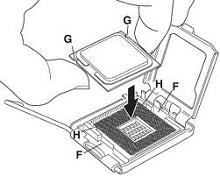Intel says it remains committed to user-replaceable CPUs for "foreseeable future"


The Internet has been abuzz this week over a report that Intel would cease using the land grid array (LGA) socket package with the release of its future Broadwell processors, with ZDNet's Adrian Kingsley-Hughes getting confirmation of the decision from an Intel system OEM and a pair of motherboard manufacturers. Even rival AMD weighed in, pledging its allegiance to socketed CPUs.
The result was that Intel felt necessary to address such concerns, which would gravely disappoint the enthusiast community that thrives on being able to replace a processor in its builds. Company spokesman Daniel Snyder spoke with Maximum PC, and he said that Intel had no intention of abandoning the LGA socket for the "foreseeable future." Completely shifting to soldered-on CPUs made no sense from the outset, as Chipzilla would be ceding the enthusiast market to AMD at a time when its rival is reeling.
However, that doesn't mean that Intel wouldn't use ball grid arrays (BGA) for a segment of the desktop market. While being able to upgrade parts is sacrosanct to DIY types, budget buyers might care less if they can replace the CPU on their $300 Pentium desktop. And as more people switch to all-in-one PCs, the use of BGA packaging in that form factor makes sense as a space-saving technique.
In other words, don't be surprised if support for the "foreseeable future" means the enthusisast realm of replaceable chips is safe for now, even if other market segments get the LGA socket phased out. But when gaming PC companies start shipping systems with BGA packaging, then you'll know to be worried.
[Image Source: Intel]